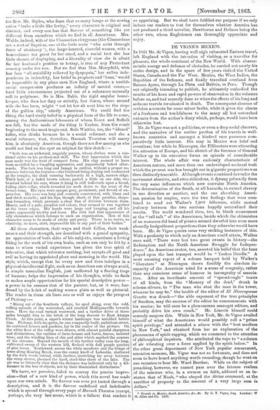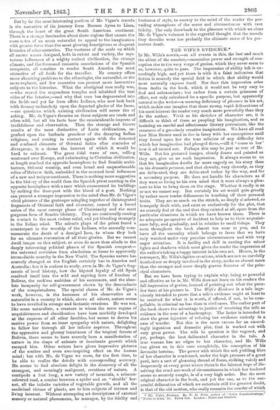DE VIGNE'S MEXICO.
IN 1851 Mr. de Vigne, having well nigh exhausted Eastern travel, left England with the intention of visiting, as a traveller for pleasure, the whole continent of the New World. With charac- teristic energy and defiance of obstacles, he carried out nearly his entire design, and in the space of five years visited the United States, Canada and the Far West, Mexico, the West Indies, the Republics of the Isthmus, and finally travelled overland from Buenos Ayres, through La Plata and Bolivia, to Peru. Though not originally intending to publish, he ultimately embodied the results of his keen and rapid powers of observation in the volumes before us, and had scarcely done so when the effects of his long and arduous travels terminated in death. The consequent absence of revision accounts for some minor faults, while it gives the charm of a freshness and truthfulness to the many all but untouched extracts from the author's diary which, perhaps, would have been otherwise lost.
Mr. de Vigne was not a politician, or even a deep social observer, and the narrative of the earlier portion of his travels in well- known countries and amongst a kindred race possesses com- paratively little interest. His stay in Mexico was brief and eventless; but while in Nicaragua, the Filibusters were attracting the attention of Europe, and his sketch of the fortunes of General Walker up to his execution forms an episode of considerable interest. The whole affair was curiously characteristic of American nature, and more than one undeveloped national trait which the present war has brought out in gigantic proportions was then distinctlytraceable. Although events combined to render the movement abortive, and even ridiculous, it dprang primarily from the very same influences which now convulse North America. The determination of the South, at all hazards, to extend slavery in one direction or another, and the one absorbing Ameri- can passion for empire, were the two feelings that were com- bined to send out Walker's 7,000 followers, while mutual jealousy between the two sections happily neutralized their results. The world wondered then, too, in blank amazement at the "tall talk" of the Americans, beside which the skirmishes of an unsuccessful band of pirates seemed dwarfed into even more absurdly insignificant proportions than they otherwise would have been. Mr. de Vigne quotes some very striking instances of this. With a profanity to which only an American could attain, Walker once said, "There were but two great events in history—the Redemption and the North American Struggle for Indepen- dence." An American orator, too, asserted his belief that the tune played upon the last trumpet would be "Yankee Doodle." A most amusing report of a solemn banquet held by Walker's " liberators " at Nicaragua shows forcibly the absolute in- capacity of the American mind for a sense of congruity, rather than any conscious sense of humour in incongruity of associa- tion. After an inordinate amount of " spread-eagle " toasts of all kinds, from the "Memory of the dead," drunk in solemn silence, to "The man who shot the man in the tower, whoever he may be," the health of the editor of El Nlearaguense Gazette was drunk—" the able exponent of the true principles of freedom, may the success of the editor be commensurate with his merits ; he will soon be a phenomenon amongst editors, and probably drive his own coach." Mr. Lincoln himself could scarcely surpass this. While in New York, Mr. de Vigne availed himself of what the Americans would possibly call a "prime spirit privilege," and attended a séance with the "best medium in New York," and obtained from her an explanation of the phenomena of spirit-rapping, which we commend to the attention of philosophical inquirers. She attributed the raps to "a column of air vibrating over a force applied by the spirit below." In the other great department of New York popular amusement, sensation sermons, Mr. Vigne was not so fortunate, and does not seem to have heard anything worth recording, though he went on one occasion to hear Mr. Ward Beecher. While on the subject of preaching, however, we cannot pass over the intense realism of the minister who, in a sermon on faith, adduced as an in- stance that of Noah, "who obeyed the divine command, at the sacrifice of property to the amount of a very large sum in dollars."
* Trawls in Me.neo, South America, dc. Av, By G. T. Vigil°, Esq. London : W E. Allen and Co. 180.
But by far the most interesting portion of Mr. Vigne's travels is the narrative of his journey from Buenos Ayres to Lima, through the heart of the great South American continent. There is a strange fascination about these regions that causes the mere notes of an acute naturalist to appeal to the imagination with greater force than the most glowing descriptions or eloquent histories of other countries. The vastness of the scale on which all nature seems designed, both in extent and variety, the mys- terious influences of a mighty extinct civilization, the strange climate, and the thousand romantic associations of the Spanish conquests, all combine to render South America the most
attractive of all fields for the traveller. No country offers more absorbing problems to the ethnologist, the naturalist, or the mere explorer, and few countries can present more instructive subjects to the historian. What the aboriginal race really was, —who reared the stupendous temples and inhabited the vast cities of the interior,—and why that race has degenerated into the feeble and yet far from effete Indians, who now look back with dreamy melancholy upon the departed glories of the Incas, —are questions which existing civilization will never tire of asking. Mr. de Vigne's theories on these subjects are crude and often wild, but all his facts bear the unmistakeable impress of truthfulness and observation. Then the strange and bizarre results of the most distinctive of Latin civilizations, en- grafted upon the barbaric grandeur of the decaying Indian religions, and coming in contact again with the distorted and confused elements of Oriental faiths after centuries of divergence, is a theme the interest of which it would be Lard to exhaust. The great tidal wave of race, rolling westward over Europe, and culminating in Christian civilization, at length reached the opposite hemisphere to find Semitic archi- tecture, Oriental worship, and even broad and unquestionable relics orblebrew faith, embedded in the accreted local influences of a new and unique continent. There is nothing more suggestive in the history of the world than the Spanish priest meeting in the opposite hemisphere with a race which consecrated its buildings by striking the door-post with the blood of a goat. Nothing can present a stranger impression to the mind than Mr. de Vigne's vivid pictures of the grotesque mingling together of disintegrated fragments of Oriental faith and character, caused by a forced union of the most corrupt phase of Christianity and the most gorgeous form of Semitic idolatry. They are continually coming in contact in the most violent relief, and yet blending strangely in the Indian mind. The miracle plays of the priest found a counterpart in the worship of the Indians, who annually com- memorate the death of a demigod Inca, to whom they look for an ultimate restoration of all their glories. But we cannot dwell longer on this subject, or even do more than allude to the deeply interesting political phases of the Spanish conquest— the universal revulsion from absolutism at home to apparently irremediable anarchy in the New World. The Spanisn nature has scarcely .changed, as the English certainly has in America and Australia ; but it is curious to study, even in Mr. de Vigne's frag- ments of local history, how the bigoted loyalty of old Spain resolved itself into the wild and aspiring love of freedom of Bolivar, the reckless ambition of his successors, and the abso- lute incapacity for self-government shown by the descendants of the conquistadores. The special charm of Mr. de Vigne's work, however, is the keenness of his observation as a naturalist in a country in which, above all others, nature seems to have revelled in strange and fantastic creations. He was not, like some naturalists, a creature in whom the mere organs of acquisitiveness and classification have been morbidly developed at the expense of all other faculties, but seems to derive his motive power from an inner sympathy with nature, delighting to follow her through all her infinite caprices. Throughout the oppressive and gloomy luxuriance of the tropical forests of Bolivia, there seems to have scarcely been a manifestation of nature in the shape of animate or inanimate growth which escaped him. Other writers have given impressive pictures of the sombre and even awe-inspiring effect on the human mind ; but with Mr. de Vigne we seem, for the first time, to be able to realize the details with corresponding accuracy. He seems to find absolute delight in the discovery of all the strangest, and seemingly malignant, creations of nature. A centipede a foot long, a new variety of tarantula, a crimson- coloured toad, a combat between a spider and an " alcalde" hor- net, all the infinite varieties of vegetable growth, and all the medicinal virtues of plants, are to him subjects of intense and living interest. Without attempting set descriptions of external scenery or natural phenomena, he manages, by the fidelity and
freshness of style, to convey to the mind of the reader the per- vading atmosphere of the scene and circumstances with rare felicity. The only drawback to the pleasure with which we close Mr. de Vigne's volumes is the regretful thought that the travels they describe were too probably the ultimate cause of his pre- mature death.































 Previous page
Previous page